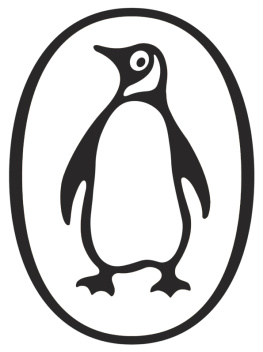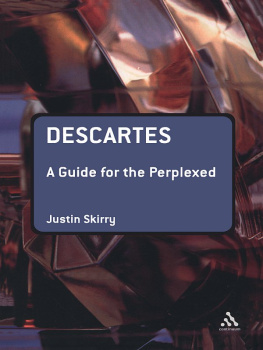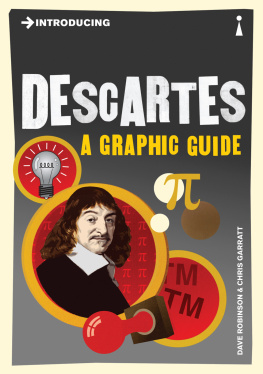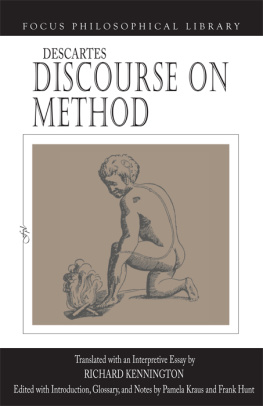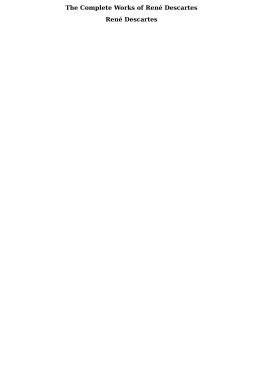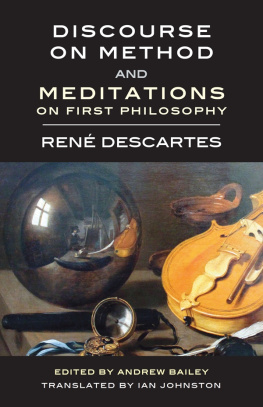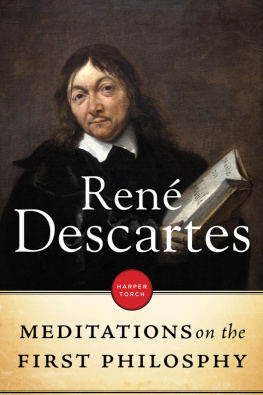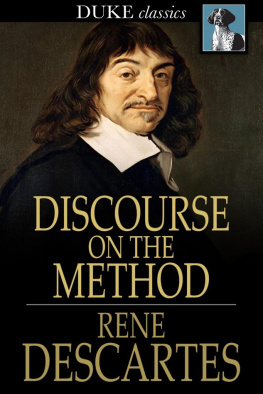Descartes René - Discourse on method: and, the meditations
Here you can read online Descartes René - Discourse on method: and, the meditations full text of the book (entire story) in english for free. Download pdf and epub, get meaning, cover and reviews about this ebook. City: New York;Harmondsworth;Eng, year: 1985;2008, publisher: Penguin Group USA, Inc., genre: Science. Description of the work, (preface) as well as reviews are available. Best literature library LitArk.com created for fans of good reading and offers a wide selection of genres:
Romance novel
Science fiction
Adventure
Detective
Science
History
Home and family
Prose
Art
Politics
Computer
Non-fiction
Religion
Business
Children
Humor
Choose a favorite category and find really read worthwhile books. Enjoy immersion in the world of imagination, feel the emotions of the characters or learn something new for yourself, make an fascinating discovery.
- Book:Discourse on method: and, the meditations
- Author:
- Publisher:Penguin Group USA, Inc.
- Genre:
- Year:1985;2008
- City:New York;Harmondsworth;Eng
- Rating:4 / 5
- Favourites:Add to favourites
- Your mark:
- 80
- 1
- 2
- 3
- 4
- 5
Discourse on method: and, the meditations: summary, description and annotation
We offer to read an annotation, description, summary or preface (depends on what the author of the book "Discourse on method: and, the meditations" wrote himself). If you haven't found the necessary information about the book — write in the comments, we will try to find it.
No Description Available
Discourse on method: and, the meditations — read online for free the complete book (whole text) full work
Below is the text of the book, divided by pages. System saving the place of the last page read, allows you to conveniently read the book "Discourse on method: and, the meditations" online for free, without having to search again every time where you left off. Put a bookmark, and you can go to the page where you finished reading at any time.
Font size:
Interval:
Bookmark:
PENGUIN  CLASSICS
CLASSICS
DISCOURSE ON METHOD AND THE MEDITATIONS
R EN D ESCARTES was born in 1596 at La Haye near Tours, and educated at the Jesuit College at La Flche. Like many of his generation he contested the value of an education based on Aristotelianism and, after leaving college, he attempted to resolve the sceptical crisis of his age by inventing a method of reasoning based on mathematics. After serving as a soldier in Holland, Bohemia and Hungary, he left the army in 1621 and devoted himself to science and philosophy. In 1629 he retired to Holland where he lived and worked in great seclusion for twenty years. However, his doctrines involved him in some bitter arguments with Dutch theologians, and in 1648 he accepted an invitation from Queen Christina of Sweden to instruct her in philosophy. He died in Stockholm in 1650.
F. E. S UTCLIFFE , Chevalier de lOrdre National du Mrite, was Professor of classical French Literature at the University of Manchester from 1966 until 1982. He joined the staff of that University in 1946, after serving for six years in the Royal Artillery. He published La Pense de Paul Valry (1954), Guez de Balzac et son temps, Littrature et politique (1959), Le Ralisme de Charles Sorel, Problmes humains du XVIIe sicle (1965), an edition of the Discours politiques et militaires, of Franois de la Noue (1967) and Politique et culture 15601660 (1973). Professor Sutcliffe died in 1983.
AND THE
*
Translated with an Introduction
by F. E. Sutcliffe
PENGUIN BOOKS
PENGUIN BOOKS
Published by the Penguin Group
Penguin Books Ltd, 80 Strand, London WC2R 0RL, England
Penguin Putnam Inc., 375 Hudson Street, New York, New York 10014, USA
Penguin Books Australia Ltd, 250 Camberwell Road, Camberwell, Victoria 3124, Australia
Penguin Books Canada Ltd, 10 Alcorn Avenue, Toronto, Ontario, Canada M4V 3B2
Penguin Books India (P) Ltd, 11 Community Centre, Panchsheel Park, New Delhi 110 017, India
Penguin Books (NZ) Ltd, Cnr Rosedale and Airborne Roads, Albany, Auckland, New Zealand
Penguin Books (South Africa) (Pty) Ltd, 24 Sturdee Avenue, Rosebank 2196, South Africa
Penguin Books Ltd, Registered Offices: 80 Strand, London WC2R 0RL, England
www.penguin.com
This translation first published 1968
44
Copyright F. E. Sutcliffe, 1968
All rights reserved
Except in the United States of America, this book is sold subject to the condition that it shall not, by way of trade or otherwise, be lent, re-sold, hired out, or otherwise circulated without the publishers prior consent in any form of binding or cover other than that in which it is published and without a similar condition including this condition being imposed on the subsequent purchaser
ISBN: 9781101493847
B ORN on 31 March 1596 at La Haye in Touraine, Descartes was the third son of a country gentleman who, after seeing service in the army, had become councillor of the Parlement of Britanny. At the age of ten he entered the Jesuit college of La Flche where he stayed for eight years. The University, which had been so brilliant in the sixteenth century, had fallen to a low level as a consequence of the wars of religion and the successive purges which had led to an atmosphere of suspicion not conducive to creative activity. The Jesuits put their hands on the colleges with remarkable speed and within a very short time had a virtual monopoly of the education of the ruling classes. The Jesuit order was young and essentially modern, not limiting itself to theology, but devoting part of its time to literary studies and to profane sciences. In borrowing thus the arms of humanism, it set out to be a militant order with a high degree of culture whose members could mingle in society and discuss on a footing of equality with the lay intelligentsia.
In its colleges the order laid the greatest emphasis on pedagogical training, unlike the university of the Renaissance where erudition had had pride of place. In other words the idea of method was at the centre of its educational practice. Everything was done according to rules: the way of placing ones feet, of deporting oneself, of speaking, and so on; but it is important to remember that this preoccupation with method did not denote a spirit of routine and idleness. On the contrary, it arose from a desire to achieve the efficacious, from a will to succeed. In spite of his criticism of an education of which the basis was constituted by the classical humanities (the sciences, although not excluded, were envisaged from a purely practical angle and were directed towards training in the art of fortification), Descartes had nothing but respect for the actual methods of the Jesuits and throughout his life he sought their approval of his work. It is, moreover, indicative of the influence exercised upon him by these methods that his first writing, which we no longer have, was a treatise on the rules of fencing and his second an examination of the mathematical basis of harmony.
In 1617, like many compatriots of his class, he went to learn the art of war in the army of Prince Maurice of Nassau at Breda. After two years of service, disappointed by the lack of opportunities to fight, he moved to Germany and to the army of the Duke of Bavaria, Maximilian, but here too inactivity was all that he found and he finally left the army in 1621. These, however, were determining years for his philosophical development. It was Beeckman, the Dutch mathematician, who, impressed by the vigour of the young Descartes intelligence, advised him to concentrate his attention on the problems of mathematical physics. Descartes seized upon the idea with enthusiasm and, as early as 1619, was writing to Beeckman: What I wish to finish is an absolutely new science enabling one to resolve all questions proposed on any order of continuous or discontinuous quantities. The whole of Cartesian philosophy is contained in embryo in this phrase. However, he continued, during the succeeding nine years, to disperse his efforts, interesting himself in medicine, chemistry and optics, and to travel widely. It was only after his conversation with the founder of the Oratory, Cardinal de Brulle in 1627, that he finally set to work. During a meeting of philosophers and theologians, Descartes had spoken of the ideas which he had nurtured in 1619. Brulle encouraged him to pursue his meditations, to use them to serve the faith and to communicate method to medicine and ethics. That human happiness is conditioned by the progress of medicine, Descartes never doubted, and he never ceased to preoccupy himself with the problem. But the constitution of medicine as a deductive science revealed itself as more difficult than that of ethics and it was to this subject in particular that he turned. He corresponded on the subject with Princess Elisabeth of Bohemia, and composed for Queen Christine of Sweden his Passions of the Soul which contains an exposition of his ethics conceived as science.
In 1649 he accepted an invitation from the Queen to go to the Swedish Court in Stockholm to instruct her in his philosophy. The unaccustomed cold and the necessity, imposed by the queen, of giving her lessons at five in the morning proved too much for the philosophers health. He contracted inflammation of the lungs and died on 11 February 1650.
*
The Discourse on Method, one of the most famous texts in the French language, presents something of a paradox. The work of a thinker, who whatever else is known of him, has for three centuries been considered as the prototype of clarity, it is curiously obscure, its plan a caricature of logical composition. The first section of this preface to three scientific treatises contains a biography; the second a methodological exposition which, instead of being continued by details of its application to the sciences, is followed by a chapter on ethics and another on metaphysics. The thread is renewed in the fifth chapter, after which the sixth and last forms a sort of new introduction taking up themes already treated.
Next pageFont size:
Interval:
Bookmark:
Similar books «Discourse on method: and, the meditations»
Look at similar books to Discourse on method: and, the meditations. We have selected literature similar in name and meaning in the hope of providing readers with more options to find new, interesting, not yet read works.
Discussion, reviews of the book Discourse on method: and, the meditations and just readers' own opinions. Leave your comments, write what you think about the work, its meaning or the main characters. Specify what exactly you liked and what you didn't like, and why you think so.

